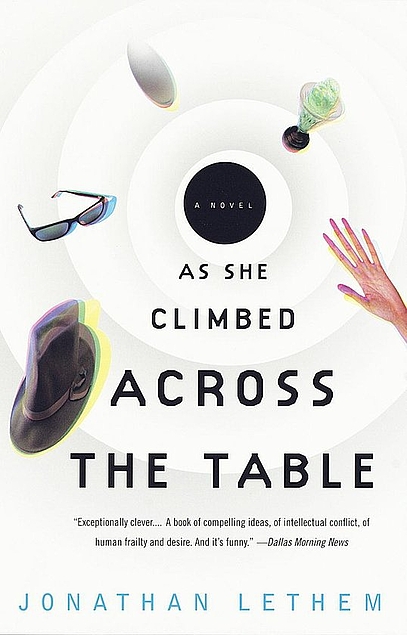Jonathan Lethem "As She Climbed Across the Table: A Novel" (Vintage)

This is the first book by Lethem that I read. I enjoyed the pseudo-physics and the non-stop academic cynicism and cynical academics. Philip, the main character of the book, is very well constructed. You understand him. You hear his thoughts, you listen to his conversations, and you know how he is feeling at any given moment. The world is filtered through Philip. Philip interprets the world. So at the end of the book, when Braxia explains his theory about Lack, and even later when Philip and Lack are one, we can look back and re-read the world Philip has already defined for us, constructed with his ample chatter, his intellectual observations, and his obsessive search for Alice - aptly named for another Alice, lost in a rabbit's hole, an endless pit, Lack - and we can fully appreciate how we construct reality. (Funny, this makes even more sense after reading about the correspondence and difference between one's own reality and the shared common reality and how humans come to learn the difference in Kathryn Schultz's Being Wrong. Lack, the error, defines and constructs a world, or many worlds. Now I am beginning to make nonsense sense.)
But something is missing here. Perhaps I wanted more to know about how and why Alice fell in love with the void. I felt like Lethem or Philip tried to explain this to me many times, but failed. Or I was not convinced by any of their banter? I am not sure.
All in all, it was an enjoyable read. Philip sounds a lot like what I sound like in my head, so I had no trouble following him through winding chains of thought. But those who do not like wordy, witty, and sometimes tiring chatter might find Philip a bit too much.

This is the first book by Lethem that I read. I enjoyed the pseudo-physics and the non-stop academic cynicism and cynical academics. Philip, the main character of the book, is very well constructed. You understand him. You hear his thoughts, you listen to his conversations, and you know how he is feeling at any given moment. The world is filtered through Philip. Philip interprets the world. So at the end of the book, when Braxia explains his theory about Lack, and even later when Philip and Lack are one, we can look back and re-read the world Philip has already defined for us, constructed with his ample chatter, his intellectual observations, and his obsessive search for Alice - aptly named for another Alice, lost in a rabbit's hole, an endless pit, Lack - and we can fully appreciate how we construct reality. (Funny, this makes even more sense after reading about the correspondence and difference between one's own reality and the shared common reality and how humans come to learn the difference in Kathryn Schultz's Being Wrong. Lack, the error, defines and constructs a world, or many worlds. Now I am beginning to make nonsense sense.)
But something is missing here. Perhaps I wanted more to know about how and why Alice fell in love with the void. I felt like Lethem or Philip tried to explain this to me many times, but failed. Or I was not convinced by any of their banter? I am not sure.
All in all, it was an enjoyable read. Philip sounds a lot like what I sound like in my head, so I had no trouble following him through winding chains of thought. But those who do not like wordy, witty, and sometimes tiring chatter might find Philip a bit too much.

